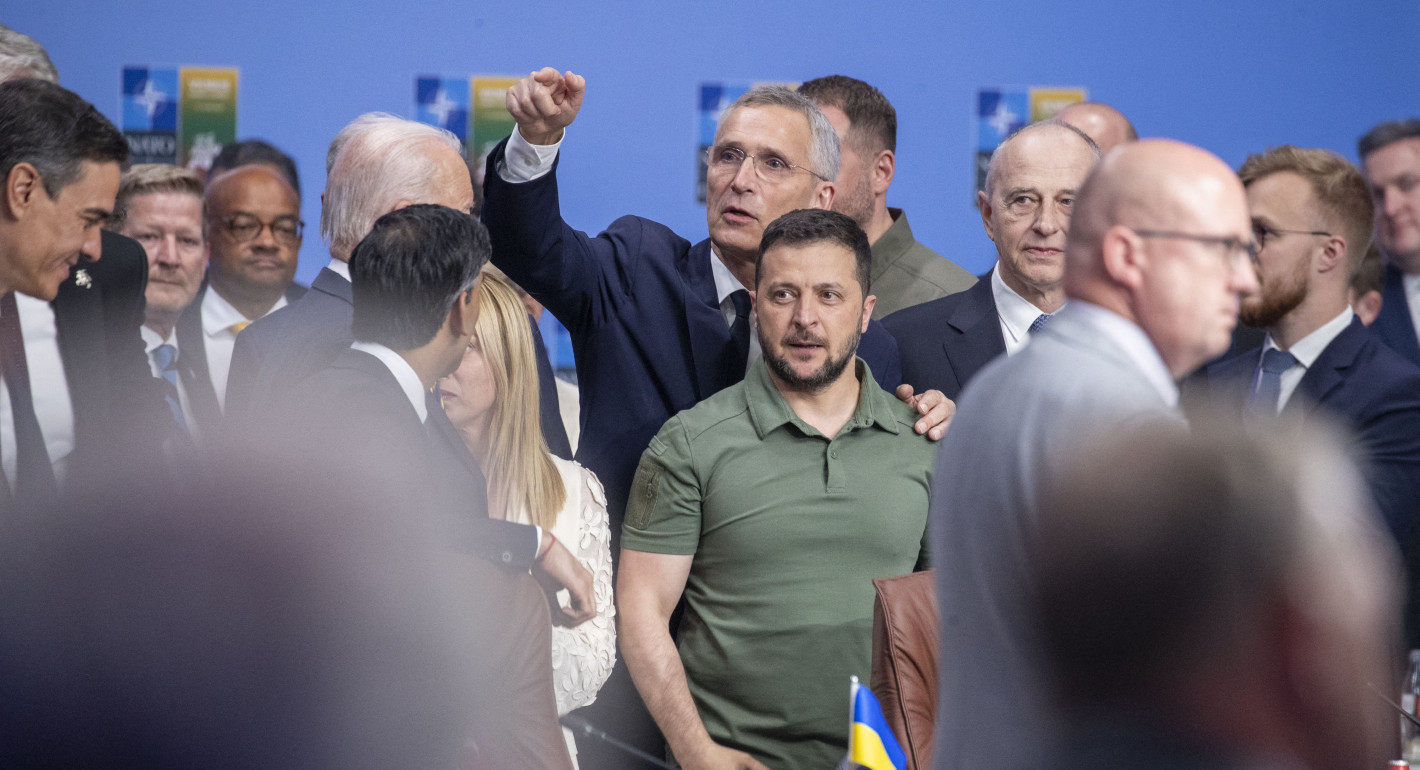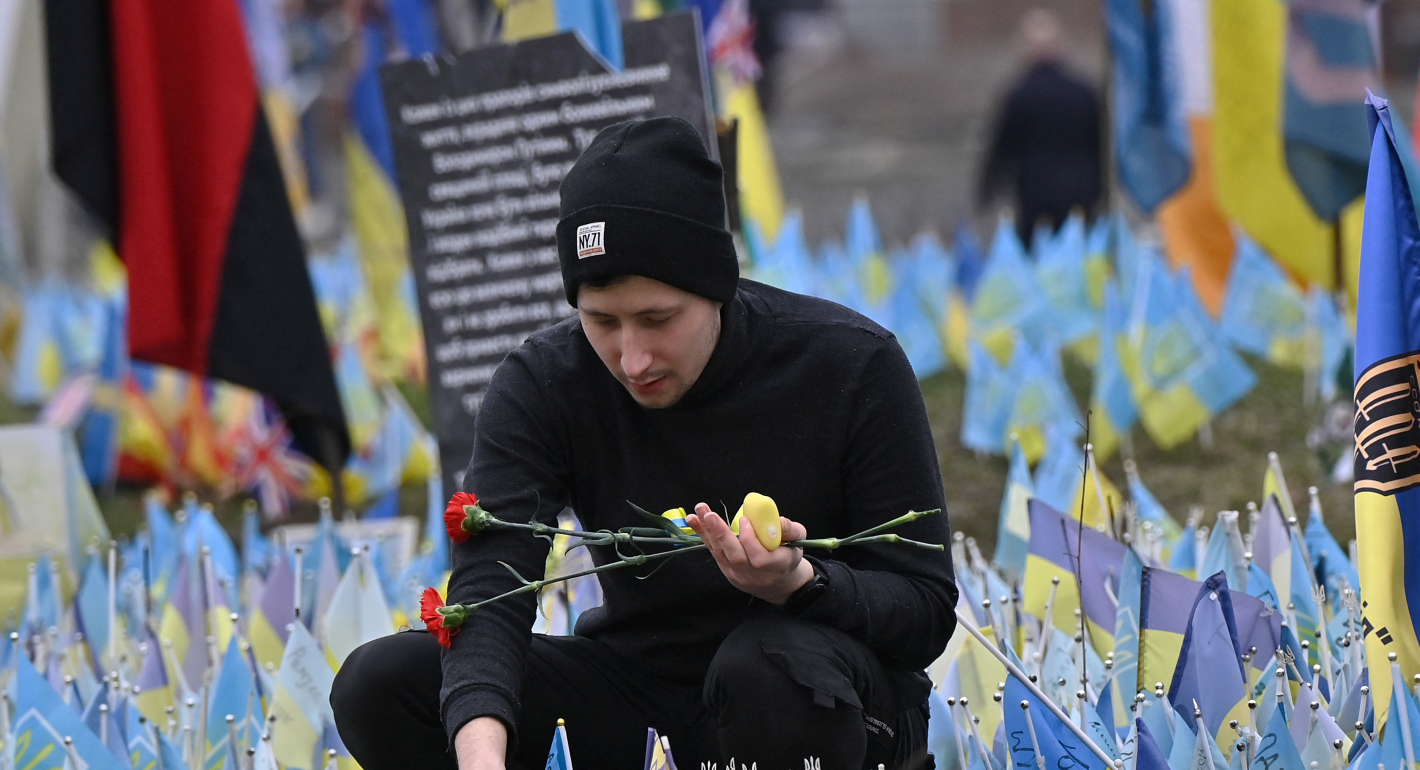On this week’s episode of The World Unpacked, host Sophia Besch speaks with Eric Ciaramella, senior fellow in the Russia and Eurasia Program, about Ukraine and the upcoming NATO summit in Washington. An excerpt from their conversation, which has been edited for clarity, is below.
Sophia Besch: This summit is very much taking place in the shadow of last year’s summit. We had a really contentious debate over Ukraine last year. What were your main takeaways?
Eric Ciaramella: In talking to European and American officials, the constant refrain I’ve heard ahead of Washington is “no repeat of Vilnius.” And what they mean is the acrimony that was displayed between Ukrainian leadership and NATO member-state leadership over the issue of membership invitation—which obviously Ukraine wanted, and still wants, and pursued up until the last minute of the Vilnius summit.
But the allies did not have consensus to be able to invite Ukraine. And so that created a very unusual situation where the communiqué text was being negotiated on the spot at the very last minute. Typically, at big summits like this, you have all of the major issues wrapped up weeks or days in advance. And the fact that senior officials were having to make decisions about language at the last minute, tweets were being sent out, and feelings were hurt did not create a great atmosphere.
That being said, the Vilnius summit did achieve some significant breakthroughs for Ukraine. The two main policy decisions that allies reached was number one, converting the NATO Ukraine Commission to a NATO Ukraine Council. This elevates that body as the main consultative forum between Ukraine and the allies that Ukraine can call upon for advice, for consultations if they perceive threats, if they want to talk about any issues in the Euro-Atlantic security space. That was a big win for the Ukrainians.
The second was removing the requirement for a membership action plan, which was typically seen as the step before getting a formal invitation. From the allies’ perspective, saying that Ukraine no longer needed that was an effort to say to the Ukrainians that, “We can't invite you now, but we’re trying to remove all the possible obstacles, so that if conditions warrant, we could potentially move expeditiously, without these bureaucratic obstacles in the way.”
Sophia Besch: Help us understand how Ukraine is thinking about this upcoming summit.
Eric Ciaramella: I would say that Ukrainian leadership has been much more pragmatic this time around in terms of trying to shape an agenda that really focuses on capabilities rather than on an invitation, which is clearly a bridge too far at this point. I haven’t seen the same kind of expectation-setting that we saw in advance of the Vilnius summit happening this time.
Sophia Besch: We’ve heard already some language on what the alliance is prepared to offer to Ukraine—“a bridge toward membership.” What does that mean?
Eric Ciaramella: I think the details of that are still being worked out. But what I understand it to mean is starting to institutionalize, through NATO, some of the mechanisms of long-term support for Ukraine that Ukraine’s partners, led by the United States, stood up very quickly after Russia launched its full-scale invasion.
There’s been this multilateral venue called the Ramstein Group, or the Ukraine Defense Contact Group, that the United States has led. This group of NATO allies, as well as a few dozen other countries around the world, has sought to mobilize military assistance for Ukraine. That’s been a mechanism to help the Ukrainians get what they need right now.
There’s been a shift over the past six to twelve months to start thinking about how we plan for the future. So what the allies have started to discuss is how to move some of this ad hoc planning into longer-term formats, with NATO playing a little bit more of an organizing function. I think it’s a way to future-proof the aid so that it’s put into a more predictable and sustainable policy framework. It insulates it from some of the political dynamics and uncertainties that you see in major Western countries.
It’s not necessarily a bridge in time where you say, “You’re starting to cross the bridge, and by year 2028, you’ll get to the other side and there will be membership.” It’s more finding linkages between these ad hoc arrangements and NATO, so that Ukraine is becoming more integrated into the Euro-Atlantic space while we can’t yet decide on this issue of formal institutional membership.
Carnegie This Week
Understand the world with the latest from our scholars around the world.
Sophia Besch: The Republican National Convention is set to begin on July 15, just days after the conclusion of the summit. The Republican Party has undergone considerable infighting regarding U.S. aid to Ukraine, and voters more broadly question what the U.S. and its allies get out of supporting Ukraine. How do you expect these political dynamics to shape Washington’s approach to the summit?
Eric Ciaramella: One of the challenges since the start of the full-scale invasion is that progress and success have largely been measured in the public debate, at least in Washington, as lines on a map and the state of the front. And I think you saw that especially in the lead-up to the Ukrainian counteroffensive last year, where the theory of victory was that Ukraine would launch this massive offensive and break through the Russian lines, and then fundamentally that would reshape the war and put the Ukrainians in a position to coerce the Russians into a negotiation on their terms.
Sophia Besch: It’s a very seductive narrative.
Eric: That’s why Congress was willing to fund it. It was an exciting proposition, especially after Ukraine had a lot of success in the fall of ’22. That didn’t happen, though. And I think what the Biden administration has struggled with is how to reframe the conversation.
When you look at domestic criticisms of the Biden administration, primarily coming from the Republican camp, there is this unified theme of “Biden doesn't have a strategy, and he’s just endlessly funding stalemate. We’re not going to just write a blank check.”
When you break it down further, you actually see two distinct camps emerge. You see the traditional hawks in the Republican Party who say Biden is enabling stalemate by holding back key weapons and imposing these policy restrictions and so on. [They say] it’s Biden's timidity that has created this situation, and we need to give more to Ukraine and faster. That’s the Mitch McConnell view, the Mike McCaul view. But then the other side of the Republican Party says no amount of assistance is going to help Ukraine break the back of the Russian army, so we need to cut our losses, draw down support, and force the Ukrainians into peace talks.
The issue is that both of those theories of victory are pretty unrealistic. [For the first camp] we have very small inventories of key weapon systems [such as ATACMS]. Let's say Germany decided tomorrow to provide all of its Taurus missiles to Ukraine, and Biden lifted all restrictions on the use of ATACMS. It’s still not going to change the fundamentals, which is that Russia has hundreds of thousands of troops inside of Ukraine that are dug in. This is going to be a very hard situation for the Ukrainians to change. So that theory that there is some quick Ukrainian battlefield victory out there is really not that credible.
The second camp’s theory that we just wash our hands and then suddenly a negotiation will happen and we can reach some reasonable settlement that’s durable and creates stability in Europe so that we can refocus on China—that’s also magical thinking. The issue now is for the Biden administration to reframe this quandary.
Sophia Besch: What book or paper would you recommend to better understand the issue?
Eric Ciaramello: Not One Inch by M.E. Sarotte.
It’s an amazing account of the deliberations and decisions, particularly under the Clinton administration, about NATO enlargement. But it’s so striking how much of the conversation in the early to mid-1990s was about what to do with Ukraine, and recognizing that there was a long-term security dilemma there. I think Mary did a great job using declassified meeting minutes and transcripts of Clinton’s phone calls (that she spent many years requesting through the archives) to put together this compelling narrative about how after the Cold War, NATO enlargement has been so much about Ukraine.
To listen to the full episode, use the player below or your favorite podcast app.



.jpg)


